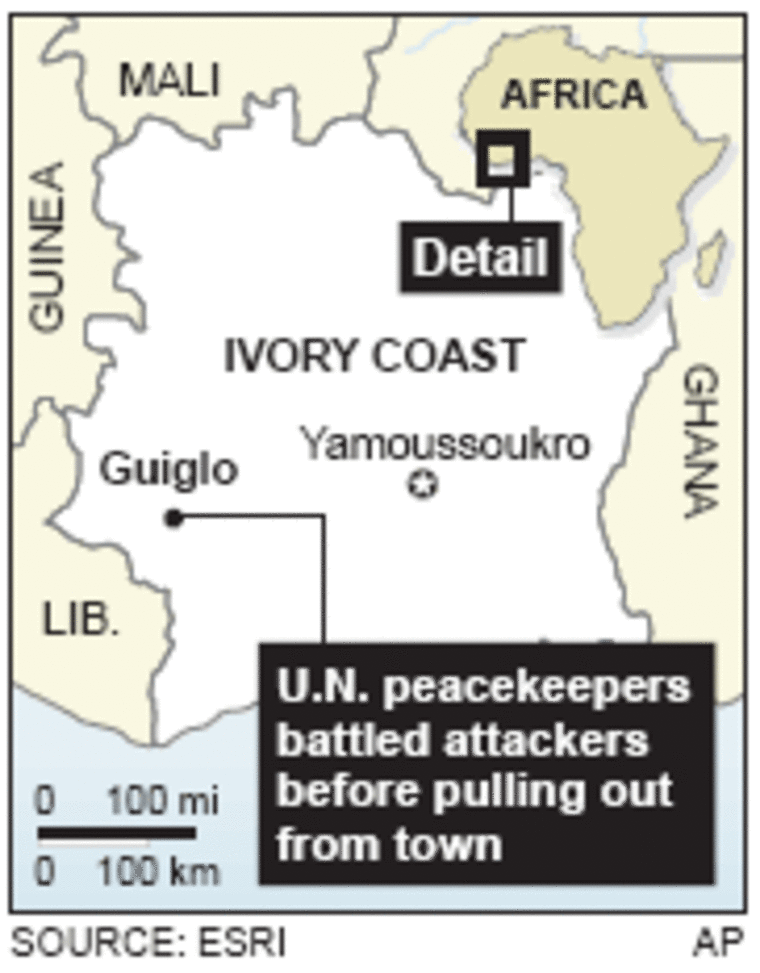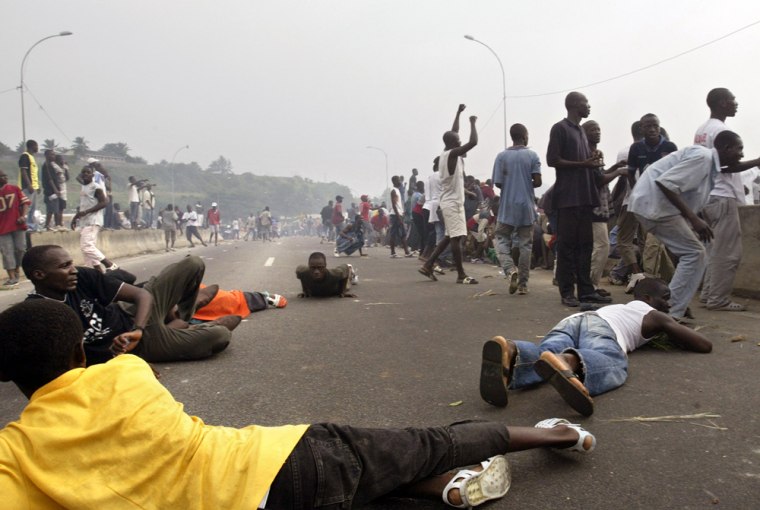U.N. peacekeepers fought off armed attackers besieging their compound in Ivory Coast’s capital Wednesday in fighting that left at least four dead and 10 wounded in a third day of unrest in the divided West African nation.
Peacekeepers and staff were evacuating the scene of the violence in the government-held south. They also were leaving a nearby town where they received threats of violence. In the main city of Abidjan, U.N. soldiers fired shots into the air and launched tear gas grenades at demonstrators for a second day, keeping about 1,000 protesters at bay.
Rebels fighting President Laurent Gbagbo have accused his supporters of orchestrating the turmoil to undermine a new government that diminishes the president’s power.
U.N. Security Council President Augustine Mahiga called Wednesday for Gbagbo to rein in the unrest and said sanctions were an option.
Gbagbo responded with a call for supporters to end three days of violent protests, telling them to go home and asking fearful workers to return to work.
The “president asks the population to pull back from the streets and to go home,” said a statement read on state media, adding that Gbagbo was calling on workers to “go back to work from tomorrow.”
Street demonstrations banned
Gbagbo has officially banned street demonstrations but his security forces have appeared to do little to disperse protesters erecting burning barricades in streets and besieging U.N. offices across the cocoa-rich south.

Businesses shut down across Abidjan amid fears of a return to all-out violence in a country divided between government and rebel control after a 2002-2003 civil war.
There were no reports of strife from the rebel-held north.
Gbagbo is leading a one-year government of national unity that has diminished his executive powers.
Ivory Coast has been on edge since he canceled planned October elections, blaming rebels’ refusal to disarm.
The latest unrest erupted Monday after a U.N.-backed international mediation group recommended no renewal for the expired mandate of parliament, which is filled with Gbagbo supporters and is viewed as the last bastion of his power.
“It’s an insurrection against the transitional government organized by Gbagbo and (his political party) to bring power back into their hands,” rebel spokesman Sidiki Konate said of the unrest.
Officials at the president’s office could not be reached for comment.
On Tuesday, the president’s ruling Ivorian Popular Front said it was withdrawing from the peace process and no longer would cooperate with the transitional government, which is composed of rebel, opposition party and ruling party ministers. It also demanded U.N. forces leave the country.
Issuing sanctions an option
“The situation is very tense indeed and the political atmosphere is also very worrisome,” Mahiga, who is Tanzania’s U.N. ambassador, told reporters Wednesday at the U.N. in New York. “We are watching and following very closely as events unfold by the hour, literally.”
Sanctions have “always been one of the options lurking on the horizon,” he said.
Nigerian President Olusegun Obasanjo, who chairs the African Union and has helped mediate many West African crises, made an unscheduled trip to Ivory Coast to meet with Gbagbo Wednesday.
Between 200 and 300 U.N. peacekeepers and staff were moving north toward a more secure area Wednesday after Bangladeshi troops exchanged fire with gunmen in the government-held town of Guiglo near the Liberia border, said Capt. Gilles Combarieu, a U.N. military observer. Guiglo residents reached by telephone said rioters were looting the offices of humanitarian groups.
A doctor at the town’s main hospital said there were two dead bodies with bullet wounds at the morgue and reports of three more corpses in the streets. Ten others were treated for gunshot wounds, the doctor said on condition of anonymity because he was not authorized to speak to reporters.
France’s Prime Minister Dominique de Villepin urged peace talks. The French army chief of staff, Gen. Henri Bentegeat, called for U.N. sanctions against Ivory Coast on Wednesday on Europe-1 radio, saying both sides have shown they are unwilling to resolve the conflict.
France retains economic interests in Ivory Coast, its former colony, and has peacekeepers in the country alongside a U.N. force. In all, there are 10,000 peacekeepers in Ivory Coast.
